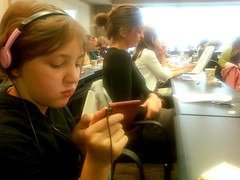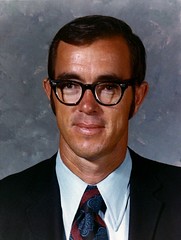Some things are hard to see when you are standing close to them. The passage of time masks growth and allows you to hold a tiny little baby and barely notice as she grows into an actual large human person thing.
And then you receive her fourth grade school portrait, taken by someone else at a place you never saw, on a day like any other when you put your baby girl on a bus and sent her into a world that sees her as a five foot tall preteen girl, You see the photo, and the person looking back at you is both the most familiar being in the world, and a mysterious stranger.
Schuyler is ten years old. I knew that, of course. But when I look at this photo of a girl who is not a baby and isn't even going to be a child much longer, the reality lands on me in a way that I guess it hadn't before.
In most ways that's no different from any father who has a hard time letting go of his little girl, I suppose. It's a cliche, I know. It's not one I particularly enjoy embodying, mostly because in matters of Schuyler and her well-being, I pride myself on being a fierce advocate for her. It's important, that position, the most important in my life, the one that really matters. I feel like it requires clarity and understanding and focus. Being all mushy-headed and "Aw, my widdle baby is all grown up, waah" feels like an idiotic, cartoonish distraction. I have no desire to be that familiar buffoon dad from any of a hundred forgettable sitcoms. And none of us really has the time for it, either.
As with all things Schuyler, however, it's not that simple. Last summer, I spoke briefly with a doctor and researcher who is familiar with both Schuyler and her monster; indeed, he is one of the world's top experts on disorders like hers. He pointed out how well Schuyler is doing and how unusual her manifestation of polymicrogyria really is. On one hand, her speech is affected, profoundly so. At the same time, she's completely ambulatory, can write and eat with only minor impediments, and appears to be cognitively high-functioning as well. She walks through the world like a perfectly normal little girl her age, and yet she's not like any other.
"I've never seen PMG manifest itself with quite such a narrow focus," he said. "Schuyler is probably unique in the whole world."
I knew that, I've always known that on some level, but to hear it put like that made it even more real. Every kid is different, I know; every child is a snowflake. But as far as that goes, Schuyler is wholly unique, like a purple snowflake.
Being Schuyler's father, then, isn't a job that always corresponds to precedence. She's a ten year-old girl who wears a bra and wants to experiment with makeup and dances around the living room to Lady Gaga. She argues with her parents; she fake pouts when she wants something and does it for real when she doesn't get it. She's like your kid in a lot of ways.
But Schuyler is also a ten year-old girl who has never had a conversation on the telephone with anyone other than her parents; actually, I don't think she's ever dialed a phone in her life. When she writes sentences using her spelling words for school, she composes pieces that work grammatically and convey meaning but also demonstrate that her understanding of language and the world is abstract and different, developed as it has in an internal world mostly her own. Schuyler has never whispered a secret in another little girl's ear. Indeed, she doesn't spend much time with other kids her age outside of school, which breaks my heart. She lives a sheltered life, of necessity, and I can feel how that's beginning to stifle her a little. But the ways out of that are complicated, and they require a level of peer acceptance that I simply can't control.
Schuyler is growing up, and she's doing so in a world that isn't completely sure what to do with her. It scares me, in part for reasons that are just those of any father in the world, but also for some that are literally mine and mine alone. In that respect, I'm a bit of a purple snowflake, too.

















